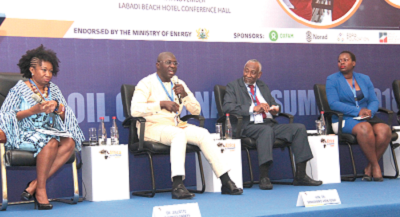
Harmonise local content policies across sectors - Participants at 4th Africa Oil Governance Summit
Jessica Acheampong & Gifty Owusu Kwarteng
Business News
Participants and speakers at the 4th Africa Oil Governance Summit have made a strong case for African governments to establish a balance between local content targets in the oil and gas sector and the growth of other sectors in the economy.
They argued that it was important to coordinate, harmonise and align local content efforts and policies across all sectors, including the oil and gas sector, to ensure that they are not counterproductive to each other.
The Head of Policy, Southern Agriculture Growth Corridor (SAGCOT) of Tanzania, Ms Neema Lugangira, said beyond the vast array of regulations governing the implementation of local content in Africa, it was crucial to start looking at the backward and forward linkages with other sectors.
“Once you have all the laws in place, it will be a good document. It will be good for it not to remain only on paper but it should be implemented.
“When it comes to the implementation, that is when we can say that we should not just focus on the oil and gas sector, we have to look at the importance of linking to the construction sector, the environment sector so it becomes a much wider scale,” she said at the forum on November 13.
She said there were a whole lot of regulations on local content in the oil and gas sector but then same was missing in the agricultural sector, for instance.
“So you are pushing for local content and it is legal in one sector and illegal in another and that effort becomes somewhat detrimental. The different policies and regulations do not speak to each other so I think one of the things we can do beyond legislation is to see how to harmonise and align the different requirements for the different sectors,” she said.
Missed opportunities
Ms Lugangira said the extractive sector was highly skilled so it was not easy to get a lot of opportunities for local people to fit in the sector even when it had to do with the provision of goods and services.
“All these people need to eat so the agriculture sector becomes crucial sector to create linkages. Catering opportunities are been given to international organisations and as a result, the country makes a loss. The technical side of the opportunities must be linked to the oil and gas sector,” she said.
Participants agreed that local content was a great tool for developing the domestic economies, promoting local workforce, and championing industrialisation and regional integration of the African continent.
The realisation of this, however, depends on the extent of African countries’ preparation for, as well as effective implementation, monitoring and evaluation of local content efforts at the national, sub-regional and regional levels.
Look at regulation
The Chief Executive Officer (CEO) of the Ghana National Gas Company (GNGC), Dr Ben Asante, said there should be by-partisan laws and regulations that would stand the test of time and also stand the test of successive government changes.
“The local content must be relooked at in a more robust manner, there is the need to have a harmonised, clear and unambiguous transferred definition of local content by all government agencies,” he said.
He said that Ghana was overburdened with regulations, which was hampering the successful implementation of local content; hence, the need for pragmatic steps by government to clean the sector.
Hindrances
Dr Asante, however, bemoaned how there was growing apathy in the implementation of the local content laws, which was crippling investor confidence.
“Uncertain regulations framework, poor physical infrastructure, corruption, unethical behaviour and the lack of skilled labour force, among others, are hampering business success on the continent,” he said.
He added that a rigid local content policy would drive away investors and its non-existence would amount to hindering the country’s fiscal structures.
Dr Asante, therefore, called for clear local content policy direction to guide appropriate legislative and institutional framework for desired outcomes, and when this was done, it would bring about ease of doing business which was the desire of every investor.
He tasked the government to strengthen institutions in order for regulations to be design for the ultimate goal of sustainable and inclusive growth, as well as investors to inculpate sustainable development in their African investment strategies. — GB
